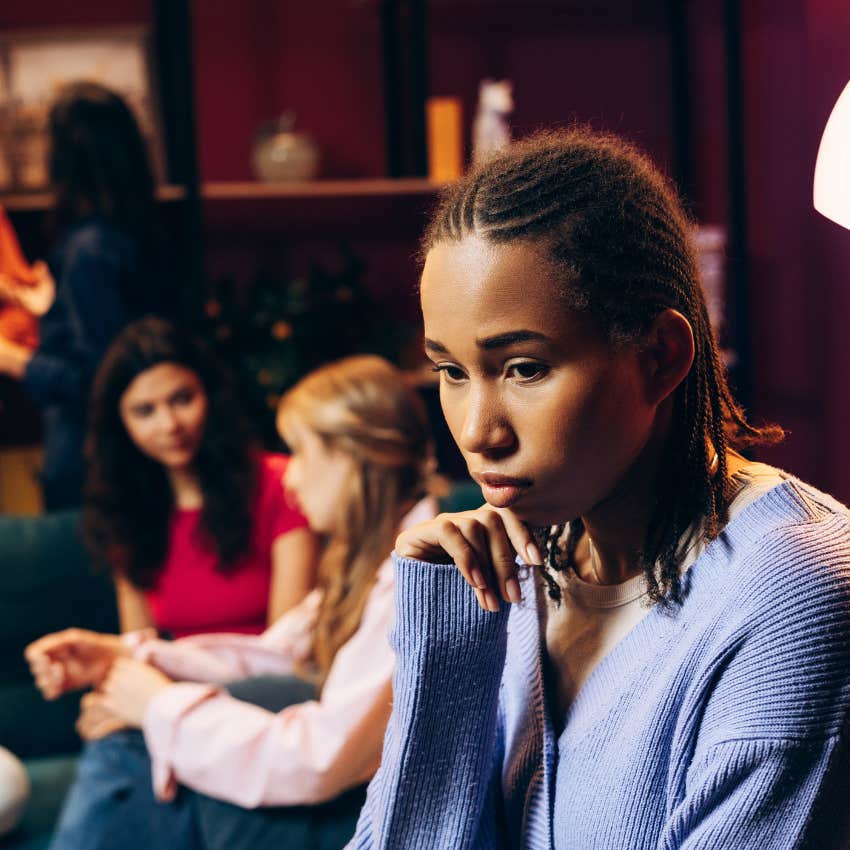If You Feel Lonely But Also Hate Being Around People, It’s Probably For These 3 Reasons
 Kian Mousazadeh | Unsplash
Kian Mousazadeh | Unsplash If you've ever felt lonely and alone, but the moment you force yourself to go out, you can't wait to get away from crowds, what you're experiencing is not uncommon. You think venturing out and connecting with others will be the solution, but you suddenly realize you hate being around people.
It's a strange feeling that can even make you more anxious and lonely. According to a 2020 study, you are likely suffering from existential loneliness, which occurs for three specific reasons.
If you feel lonely but also hate being around people, it's probably for these 3 reasons:
 AYO Production | Shutterstock
AYO Production | Shutterstock
Even people with a strong friend group and robust social life can suffer from chronic loneliness. You would think that in the age of instant connection via social media, cell phones, and other advanced technology, it would be easy to connect with others. Yet, according to the Cigna Group, 58% of U.S. adults are lonely.
As explored in a 2020 study, the loneliness that nags at you even while in a crowded room is called emotional loneliness, which "originates from the absence of an intimate figure or a close emotional attachment." Another type of loneliness, called existential loneliness, can also make you feel detached from others and the world as a whole.
However, researchers noted that existential loneliness is largely self-inflicted, and "is the result of a broader separation related to the nature of existence and, in particular, a lack of meaning in life." Feeling this way may lead you to seek comfort in the company of others, as that's often the cure for social or emotional loneliness. Unfortunately, existential loneliness "has no permanent remedy," researchers explained, as ultimately, it's a mindset.
1. You're lacking deep connections
Many people know a lot of people casually but don't consider them real friends. You connect on a surface level, but they have no idea what makes you tick. You would never share your deepest, darkest secrets with them or your emotions.
If this is the case for you, it's possible to forge deeper connections with those who already play an active role in your life. Female Mindset Mentor Jess Pinili shared a strategy called the "ABC Roles Theory" that she says can help you create more meaningful relationships.
To start, use a notebook to list the people in your life. Then, assign letters of the alphabet to different roles that people fill in your life. For example, Pinili used the letter A for deep connection, B for spiritual connection, and so on. Lastly, assign these roles to each of the people you listed.
"What this shows you is looking at how you can develop each role within your relationship," Pinili explained, adding in the caption that "not everyone can play every role." Rather, your aim should be to recognize people for the roles they do play and how you can better relate to each other within those roles.
2. You don't have a positive support system
That inability to form meaningful connections gives way to a lack of support. If you have no one to share with, there is no one to pick you up when you're feeling down or to give you advice when you are in need. Relying only on yourself can be extremely isolating.
If you find you're lacking a positive support system in your life, Robyn Tamanaha, LMFT, has suggested getting involved in a community associated with one of your hobbies to meet people with similar interests. Volunteering is another way to meet kind-hearted and similar-minded people.
3. You want to be around a specific person or people
 PeopleImages | Shutterstock
PeopleImages | Shutterstock
Being in a room full of people you don't particularly want to spend time with can make you feel lonely, especially if you long to be with someone in particular. This could happen after a breakup and a fracture in any relationship where you are accustomed to another person's company and are suddenly deprived of it. This could also be the result of grief after loss.
A person who is experiencing loneliness is susceptible to several detrimental conditions.
While "some scholars see existential loneliness as something that can be appreciated positively," researchers noted that "one finds strength in being solitary, although it takes effort to realize this situation." Having connections with others is crucial to a fulfilling life, as humans are ultimately social creatures. Dissatisfaction with life, lower self-esteem, reduced meaningfulness of life, and depression are all potential effects of loneliness.
Even if you still feel lonely when surrounded by people, social contact is attached to an increased ability to deal with that feeling when you find yourself alone. It can also improve your well-being. The negative impact of loneliness was decreased in people who spent time in the company of others and amplified when people were actually alone.
If you or someone you know is in emotional distress, reach out 24/7 to the 988 Suicide and Crisis Lifeline by dialing or texting 988 or using chat services at suicidepreventionlifeline.org to connect to a trained crisis counselor.
NyRee Ausler is a writer from Seattle, Washington, and author of seven books. She covers lifestyle, entertainment, and news, as well as navigating the workplace and social issues.

